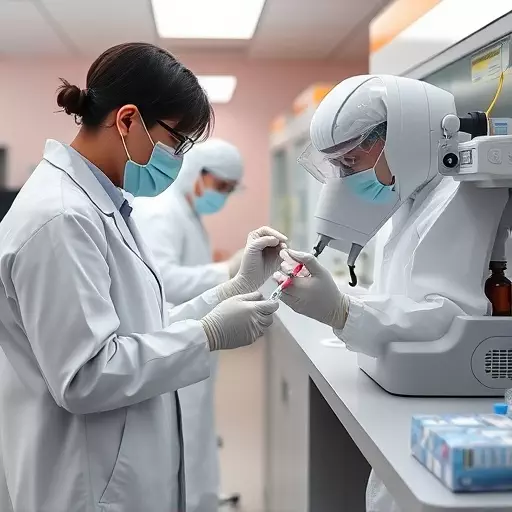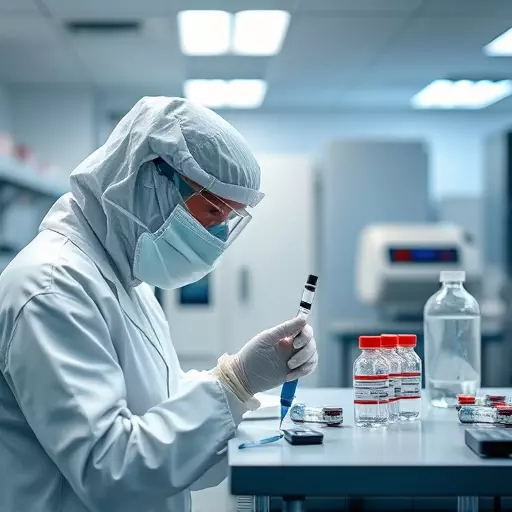In the Detroit-Livonia-Dearborn metro area, lab work is a cornerstone in combating infectious diseases and antimicrobial resistance (AMR). These facilities perform meticulous pathogen testing to identify drug-resistant strains early, enabling targeted interventions for antibiotic treatment. They also play a critical role in public health vaccination campaigns by ensuring vaccine safety, quality standards, and community trust through rigorous testing, monitoring, and education programs. The scientific rigor of labs safeguards vulnerable populations, strengthens global vaccination efforts, and fosters trust in healthcare initiatives.
“Labs serve as the backbone of public health surveillance in Detroit-Livonia-Dearborn, playing a pivotal role in detecting and combating antimicrobial resistance. This article explores how lab work in the region streamlines vaccination campaigns, ensuring efficient distribution and rigorous safety standards. Beyond clinical settings, labs engage the community through education, expanding their impact. Discover why the scientific rigor of lab procedures is essential for controlling antimicrobial resistance and implementing successful public health vaccination initiatives.”
- Labs as the Backbone of Public Health Surveillance in Detroit-Livonia-Dearborn
- Detecting and Combating Antimicrobial Resistance: The Lab's Crucial Role
- Streamlining Vaccination Campaigns: How Labs Facilitate Efficient Distribution
- Ensuring Safety and Quality Control: The Scientific Rigor of Lab Procedures
- Community Engagement and Education: Expanding the Impact Beyond Clinical Settings
Labs as the Backbone of Public Health Surveillance in Detroit-Livonia-Dearborn

In the heart of Detroit-Livonia-Dearborn, labs serve as the indispensable backbone of public health surveillance, playing a pivotal role in tracking and responding to infectious diseases. These facilities are crucial in controlling antimicrobial resistance (AMR), a growing concern globally, by conducting thorough pathogen testing and surveillance. By identifying resistant strains early on, labs enable targeted interventions, thus enhancing the effectiveness of antibiotic treatments.
Moreover, labs are instrumental in implementing successful public health vaccination campaigns. They facilitate the monitoring of vaccine efficacy and safety through rigorous testing, ensuring that vaccines distributed meet stringent quality standards. This oversight is vital for building public trust in vaccination programs and achieving high coverage rates, which are essential to controlling vaccine-preventable diseases in these communities.
Detecting and Combating Antimicrobial Resistance: The Lab's Crucial Role

In the ongoing battle against infectious diseases, laboratories, especially those in metropolitan areas like Detroit-Livonia-Dearborn, play a pivotal role in detecting and combating antimicrobial resistance (AMR). Through meticulous lab work, they analyze bacterial samples to identify emerging drug-resistant strains, providing critical data for public health officials. This early detection is essential for implementing effective vaccination campaigns. By understanding the evolving nature of pathogens, labs enable targeted interventions, ensuring that vaccines are tailored to combat the most prevalent resistant forms.
The importance of labs in controlling AMR cannot be overstated. They serve as sentinels, continually monitoring local and global health trends. This surveillance allows for prompt action when new resistant strains emerge. Furthermore, labs conduct crucial research on the effectiveness of different antibiotics against specific pathogens, contributing to evidence-based medicine. Their role in implementing public health vaccination campaigns is thus multifaceted, encompassing both early detection and informed decision-making, ultimately safeguarding communities from the escalating threat of antimicrobial resistance.
Streamlining Vaccination Campaigns: How Labs Facilitate Efficient Distribution

In the realm of public health vaccination campaigns, laboratories play a pivotal role in streamlining and optimizing distribution processes. These facilities are instrumental in ensuring the efficient and safe delivery of vaccines to communities across the Detroit-Livonia-Dearborn area and beyond. Through advanced lab work, they facilitate the testing, quality control, and standardization of vaccine doses, minimizing errors and maximizing safety. This meticulous process is especially critical when dealing with novel vaccines, where rigorous evaluation ensures their efficacy and potency.
Moreover, labs contribute significantly to controlling antimicrobial resistance by monitoring vaccine batches for any signs of contamination or deviation from established standards. Their expertise in microbial analysis helps in quickly identifying potential threats, enabling swift corrective actions. This proactive approach not only safeguards the health of recipients but also maintains public trust in vaccination programs. The role of labs is thus indispensable, connecting the dots between scientific rigor and community health protection.
Ensuring Safety and Quality Control: The Scientific Rigor of Lab Procedures

In the heart of metropolitan areas like Detroit-Livonia-Dearborn, lab work plays a pivotal role in ensuring the safety and efficacy of vaccination campaigns. These facilities employ meticulous protocols to conduct scientific rigor in vaccine development, testing, and quality control. By adhering to stringent standards, labs help mitigate risks associated with antimicrobial resistance, a growing concern globally. The rigorous testing and research conducted within these four walls are essential for identifying potential contaminants or adverse reactions early in the production process, ensuring only safe and potent vaccines reach public health clinics.
Moreover, labs serve as the backbone of implementing public health vaccination campaigns by facilitating precise batch tracking, storage conditions monitoring, and stability assessments. This meticulous attention to detail safeguards against inconsistent vaccine performance, maximizing protection for vulnerable populations. The importance of labs in controlling antimicrobial resistance cannot be overstated; their scientific rigor is a cornerstone in the ongoing battle to safeguard public health amidst evolving microbial threats.
Community Engagement and Education: Expanding the Impact Beyond Clinical Settings

Community engagement and education play a pivotal role in expanding the impact of vaccination campaigns beyond clinical settings. Labs, such as those conducting lab work in Detroit-Livonia-Dearborn, are not just focused on the scientific aspect of vaccine development; they also contribute significantly to public health through community outreach programs. By engaging with local communities, labs can dispel myths and misconceptions about vaccinations, which often hinder participation rates. Educational initiatives led by labs help foster an understanding of the importance of vaccination in controlling not only infectious diseases but also antimicrobial resistance – a growing concern worldwide.
Through interactive workshops, school visits, and media campaigns, labs can ensure that accurate information reaches diverse audiences, increasing vaccine uptake. This community-oriented approach enhances trust and cooperation, making vaccination efforts more effective. Moreover, it enables labs to gather valuable feedback from the communities they serve, thereby tailoring their strategies to meet local needs. Ultimately, this collaborative model of public health delivery strengthens the overall impact of vaccination campaigns in tackling vaccine-preventable diseases.
